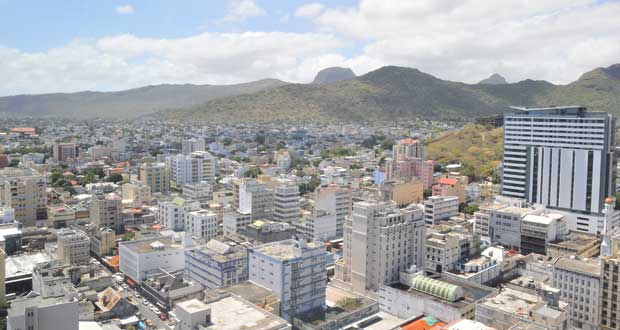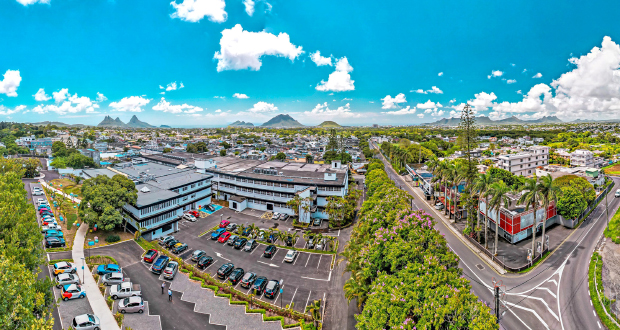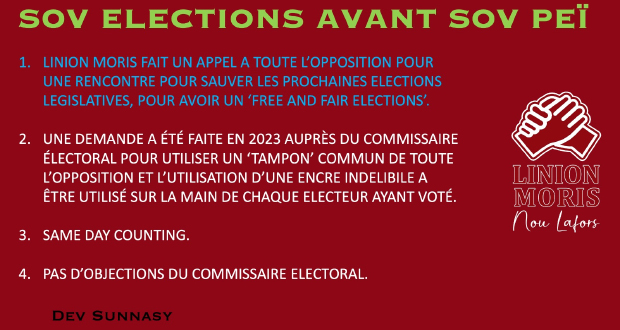Publicité
Please, Mauritius is NOT a tax haven!
Par
Partager cet article
Please, Mauritius is NOT a tax haven!

Introductory note
The purpose of this article is fourfold
i) To respond as a former Minister of Finance to the statements made by the current Minister of Finance that Mauritius is a tax haven;
ii) To defend the integrity of Mauritius as a financial centre of repute and substance;
iii) To restore confidence among global corporates, institutions and other business partners that use our international financial centre;
iv) To allay the fears of treaty partners who might be convinced by the argument that Mauritius is a tax haven.
Many industry specialists and other professionals and observers were taken aback by the reply of the Minister of Finance to a question in Parliament on global business. They are sad that he unequivocally characterises Mauritius as a ‘paradis fiscal’. They are disturbed that for the avoidance of any doubt and to entrench his description of the Mauritius international financial centre, he went to considerable lengths in an interview with l’express two days later to depict Mauritius as a tax haven. They are flabbergasted as this stand could seriously affect the reputation, brand, image and integrity of our country as a credible financial centre. They argue that this treatment of Mauritius was neither warranted nor substantiated. Especially at a time when the Prime Minister is doing his level best to shore up business confidence and sentiment and to attract more investors to our country.
What Mauritius is not
Mauritius is not a jurisdiction of shell, conduit or post-box companies. GBC 1 entities which are eligible for treaty benefits must pass the test of substance spelt out clearly in the legislation before the FSC and the MRA issue a tax residency certificate. The FSC can pierce the corporate veil if it believes that it is a shell company.
Mauritius does not promote round-tripping to enable dubious Indian companies to escape the tax net in India. The legislations, the regulations and the licensing conditions are very clear since a very long time on curbing round-tripping. Tax residency certificates are, on purpose, renewed on an annual basis after certification by auditors that there are no traces of round-tripping. In addition, all alleged cases (none has been proven to date) brought to the notice of the competent authorities of Mauritius are dealt with in a timely and efficient manner. India has congratulated the country for the effective manner in which it handles such requests.
Mauritian banks are not regularly invaded by Indian fraudsters walking freely into their branches with sacks of cash to deposit in a massive money laundering scheme. The banking system is robustly regulated and well supervised and banks carry out KYC and due diligence on clients according to best international practices. The Bank of Mauritius should know better.
Mauritius is not ripping off other countries. We have always created a conducive climate to encourage investment and the signing of double taxation treaties is one of the crucial components in that strategy. All countries from India to Singapore, from the UK to the USA, from South Africa to Mozambique do it and for exactly the same purpose. All of them try their best to maximise the allocation of taxing rights in their favour, whether in terms of taxes on capital gains, dividends, interests, royalties and fees for technical services, precisely to attract investment. This is certainly not about eroding the tax base of other countries. It is a win-win situation. India has similar, if not identical treaties, with at least 15 other countries including Singapore and Cyprus which are both much richer than Mauritius in terms of GDP per capita.
We should be proud of what we have done in the past to build a reputable international financial centre. There is no need to renege our past actions to identify new drivers of growth. Nor is there any necessity to erase or disparage what others have done to defend the integrity and good name of Mauritius. It is an established fact that many internationally recognised institutions do not characterise Mauritius as a tax haven. The Deputy Director of the IMF categorically stated in 2014 that ‘‘Mauritius is not a tax haven. It is on the white list of the OECD’’.
Of course laws and regulations are always and everywhere open to misuse and abuse by unscrupulous companies and individuals. That is why policing, monitoring and surveillance are important. In such cases, regulatory institutions such as the Bank of Mauritius and the FSC should enforce the law and apply severe sanctions, including the revocation of licenses to those who transgress the rules and regulations of the country. But exceptions cannot become the rule and black sheep should not be an excuse to cast aspersion on our financial centre.
Beware of the boomerang effect
The country has expended considerable time, money and effort over more than 20 years to slowly and patiently build a key pillar of our economy and one of the main drivers of growth. Yet the damage that could be done by inappropriate statements could be so enormous as to potentially affect the sustainability of the sector. In a globally connected and digital era, such statements are given very wide circulation and questions are being asked by many corporates and institutions that use our financial centre for their businesses. It takes a very long time to build an image, a brand and a reputation. It requires an own goal to cause incalculable harm.
What internationally recognised experts say on Mauritius
Mauritius has always rebutted the allegations of being a tax haven. While the country does not display the characteristics of a tax haven, it has sometimes been incorrectly labelled as one. It does feature occasionally on some so-called tax haven lists. But so do countries like Hong Kong, Singapore, Switzerland, Cyprus, Malta, Ireland, Luxembourg, Bahrain and Dubai. Even the USA and the UK are included in some lists. Also some jurisdictions such as the Netherlands, Denmark, Hungary, Iceland, Israel, Portugal, and Canada are at times criticised for having tax haven characteristics. But this is done by others. However policy makers from these countries would fight tooth and nail to defend the reputation and integrity of their jurisdiction.
There is no single and agreed definition of a tax haven. If we embrace the definition adopted by the very serious US Government Accountability office, based on transparency and cooperation, it is clear that Mauritius is not a tax haven. Probably the best known definition of a tax haven is that used by the OECD. It carries out extensive work on the subject and publishes its own list based on a set of objective and measurable criteria. It also periodically reviews the policies and practices of countries to ascertain their level of compliance with international best standards. It identifies states that do not meet the criteria to be a tax haven.
Four key indicators of tax havens are identified by the OECD:
i) Lack of transparency,
ii) Unwillingness to exchange information with the tax administrations of other countries,
iii) Absence of a requirement for economic substance,
iv) Nil or only nominal taxes.
The crucial question is whether Mauritius meets these indicators to be characterised as a tax haven.
i) A lack of transparency in the legislative, legal or administrative provisions
We have introduced stateof- the-art legislations that are recognised as transparent by the OECD. These are enhanced by strong legal and administrative provisions to ensure that global businesses are conducted in a well regulated environment. There is the absence of the bearer share concept. The OECD has further concluded that we have strict legislations to fight money laundering and combat the financing of terrorist activities. As per the first OECD criterion, Mauritius is not a tax haven.
ii) An unwillingness to exchange tax information with foreign tax authorities
Mauritius is a treatybased jurisdiction as we have many DTAA’s with other countries and they all include provisions for an effective exchange of information with the competent authorities of other states. In many cases, we have adopted the latest recommendation of the OECD on enhanced exchange of information and we will soon graduate to automatic exchange of information.
We are member of many organisations where we exchange information and build effective networks of cooperation. Moreover, the FSC has signed many MOU’s with several regulatory bodies in other jurisdictions to effectively exchange information. In the case of India, we have agreed to the posting of an Indian tax officer at the Indian High Commission in Mauritius to facilitate the exchange of information. Mauritius is on the OECD/G-20 white list of countries since a long time and has been subject to peerreview under the Global Forum on Transparency and Exchange of Information for Tax Purposes process to implement robust standards on exchange of information. The country has been found to be largely compliant. We have also signed an Intergovernmental agreement with the USA to implement FATCA thus giving a further example of our ongoing commitment to the exchange of information. It is clear that there is no secrecy as FATCA provides for the automatic reporting and exchange of information in relation to accounts held in Mauritius’ financial institutions by US persons.
As per the second OECD criterion, Mauritius is not a tax haven.
iii) An absence of a requirement for substance
Mauritius promotes substance over form. Substance is a key feature of the Mauritius international financial centre and this is deeply entrenched in legislations and regulations. GBC 1 companies must adhere to a set of substance requirements to obtain a tax residency certificate from the MRA that allows them to avail of treaty benefits. Entities must be controlled and managed from Mauritius, must have at least two local directors and board meetings held and chaired in Mauritius. They should also satisfy the requirements for banking transactions to be channelled through a Mauritius-based bank and for their financial statements to be kept and audited in Mauritius. Moreover, the FSC has since January 2015 introduced additional substance requirements to ensure there is more economic value addition in the jurisdiction. Also the TRC application procedures have recently been strengthened.
As per the third OECD indicator, Mauritius is not a tax haven.
iv) A country with nil or nominal taxes
Mauritius has a tax rate of 15 % and it grants a deemed foreign tax credit of 80 % to GBC 1 companies, which makes the effective tax rate at 3 %. However the contribution of taxation from global business is very high in comparison to its share of GDP. Corporate taxes from global business account for almost 30 % of the total corporate tax receipts of the government. This is significantly higher than the contribution from many other sectors, especially as global business represents around 4.5 % of GDP. It is much more than corporate tax receipts from the EPZ, tourism and the sugar industry!
On the fourth criterion of ‘‘a country with nil or nominal taxes’’, Mauritius is not a tax haven.
As rightly pointed out in a very emphatic manner by VPM Xavier Duval in his capacity as Minister of Finance last year, ‘‘we are not a tax haven; we are a lowtax jurisdiction’’.
He went on to say that ‘‘we’re not a tax haven because there is no secrecy. You can’t open a bank account here without giving your full details. We are happy to exchange tax information with all our partners’’.
Former Ministers of Finance Paul Berenger and Pravind Jugnauth also defended the integrity and reputation of Mauritius against unjustified allegations. Never have they conceded that our country is a tax haven. Neither have other Ministers of Finance.
Mauritius does not meet any of the four OECD criteria to be labelled a tax haven. In addition to the above, another consideration at times come into play when defining a tax haven.
v) The economy relies heavily on global business
Many small islands depend almost exclusively on offshore business to drive their economy. This is not the case for Mauritius. We have a very broad-based and diversified economy that runs on many cylinders and global business accounts for around 4.5 % of GDP. In many small island economies, this figure could be as high as 35 % to 40 % of GDP.
There are only around 20,000 GBC 1 and GBC 2 registered in our jurisdiction while there are more than 375,000 in the Cayman Islands and more than 1 million in the British Virgin Islands and Delaware (USA).
On the criterion of heavy dependence on offshore business, Mauritius is not a tax haven.
Mauritius is indeed not a ‘‘paradis fiscal’’. This is a wrong and a misleading labelling. We have a simple and low tax system, transparent and predictable with a broadbased, diversified, vibrant and dynamic economy of substance. We are also a very cooperative country and fully understand the importance of tax information exchange and cooperation in tax matters. We are certainly not perfect as it is still work in progress. We obviously cannot compare with New York, London or Singapore in terms of depth and width as a financial centre but we are also not one of these small island economies which depend exclusively on offshore business, have zero taxation, no transparency and hardly any substance.
Mind the contradiction
All governments have insisted that Mauritius has a clean offshore jurisdiction and its financial services are well regulated and transparent. The OECD evaluates Mauritius as being largely compliant with global tax laws on par with countries like Singapore, the Netherlands and the United Kingdom. Mauritius is also on the “white list” of both the OECD and the Financial Action Task Force. The international community does not regard Mauritius as a tax haven as evidenced by the large and growing network of tax treaties that it has in place and is negotiating with other countries. These are bilateral agreements and other countries would not agree to discuss with us if they believed that Mauritius was not operating on a fair and level playing field in these matters.
Undoubtedly there is room for improvement. We should increase substance, enhance value addition, diversify products and markets, move up the revenue chain by having more sophisticated operations and businesses in our financial centre. And we must firmly combat any abuse or misuse of our jurisdiction. But we simply cannot hoist ourselves with our own petard and cut our nose to spite our face. Whether we like it or not, tax incentives will remain a key factor to attract investment, generate jobs and stimulate growth. This is an indisputable fact. Otherwise how does one explain the new policy of granting total corporate tax exemptions to many activites. Even investment in Ghana will now be tax exempt in Mauritius. It simply shows that incentives are a key to lure investment to our shores.
Concluding Remark
The statement that Mauritius is a tax haven is very unfortunate, especially at this particular juncture in the economic development of our country when the Prime Minister is relying heavily on foreign direct investment to increase substantially the share of investment to GDP so that we can raise growth and generate thousands of jobs. The brand and the reputation of the country is primordial in that investment promotion and marketing strategy. It is my humble submission that government and other stakeholders should do everything to restore the image and the integrity of Mauritius as an international financial centre of repute and substance. Otherwise the damage could be significant.
Publicité
Les plus récents






